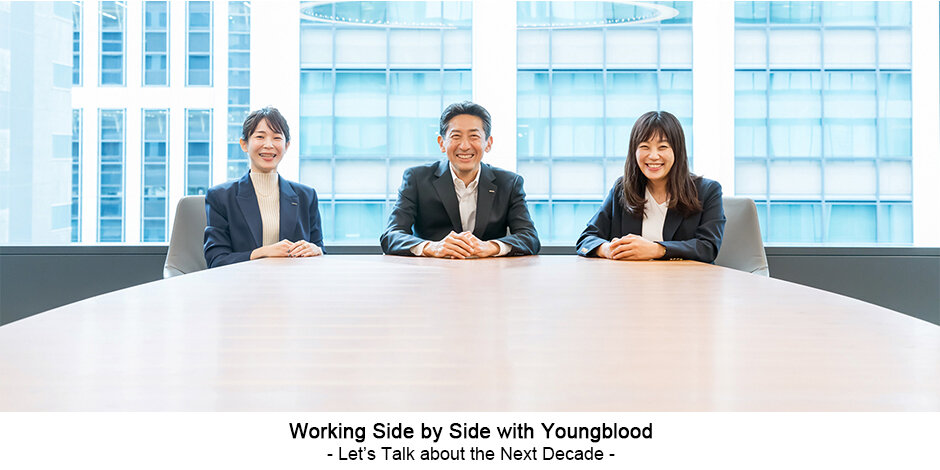
OMRON has grown into who they are today by creating social value and contributing to the development of society through their business operations in accordance with the OMRON Principles, which are based on their belief that "a business should create value for society through its key practices" One of the many examples for this was the development of the world's first automated traffic signal system in the 1960s when rapid motorization brought on rampant fatal accidents on the road. These efforts that help bring security and safety to our society are the foundations of OMRON Social Solutions, which offers an array of solutions from photovoltaic (PV) energy management systems and monitoring systems to payment processing solutions through their Social Systems business. With climate change, population decline, and other changes occurring in our environment today, making it difficult to predict what is to come, the company is here to offer a wide range of solutions to their corporate clients and the people of local communities by collaborating with them as their partner to overcome challenges the future holds. In a talk between Toshio Hosoi, President and CEO of OMRON Social Solutions, and two of the company employees, their determination to design a society where everyone is smiling was palpable.
Hosoi: We take it as our mission to make our society a secure and safe place for people to live in. Back in the 1960s, OMRON introduced a string of "world's firsts" to the world. For instance, a fully automated, traffic-responsive electronic signal was installed on a busy street in Kyoto City in 1964. It was a groundbreaking system capable of detecting the number of vehicles at the intersection and changing the lights accordingly. Then in 1967, OMRON developed an unmanned railway station system equipped with automated ticket gates and ticket vending machines, which helped reduce crowding levels for commuters. The OMRON brand is an established part of the infrastructure of our society and is a source of pride for all of us as members of this company.
OMRON has kicked off a new long-term vision called ŃĆÄShaping the Future 2030 (SF 2030)ŃĆÅ, where we have identified three social issues to address, namely, the achievement of carbon neutrality, building a digital society, and extension of healthy life expectancy. Of the three issues, we are taking on the first two.
Yoshida: One of the obvious things that we need to do to achieve carbon neutrality is to increase renewable energy. The most common type of renewable energy is solar PV. It has become commonplace owing partly to a scheme known as feed-in tariff (FIT), under which the government purchases all electricity produced from the PV system at a fixed price. This encouraged a large number of businesses to get into solar power. When you take the bullet train to go to the countryside, you see so many PV systems through your windows, but some of them make you wonder if they are really in operation. In fact, I have talked to many people in the industry, and the reality is that some of them are finding it hard to keep their PV systems maintained and managed in good form or troubled by equipment failures. As we face more frequent occurrences of natural disasters due to climate change, it is time we committed ourselves to working on carbon neutrality. That was the starting point for us when we devised a service for fixed-rate rental of power conditioners. Called ŃĆÄPOWER CONTINUEŃĆÅ, it was the first of its kind in the industry, and we rolled it out for operators last year.
Yokota: I changed jobs four years ago because I wanted to help solve regional challenges. I joined OMRON Social Solutions, whose mission was to offer "social solutions to solve social challenges."
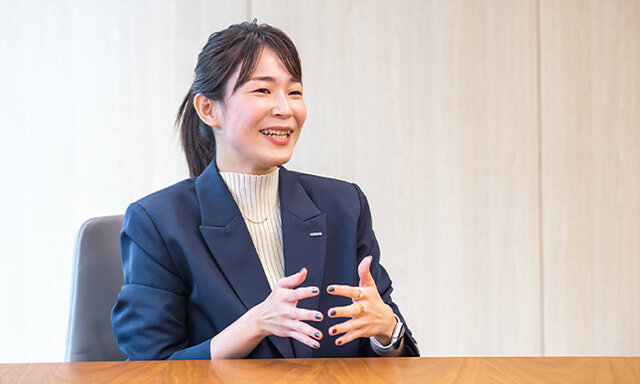 "The fieldwork I did in disaster-stricken areas was where it all started for me" (Ms. Yokota)
"The fieldwork I did in disaster-stricken areas was where it all started for me" (Ms. Yokota)For me, it all started with an experience I had as a student. I visited the town of Minamisanriku in Miyagi Prefecture for fieldwork, and there I witnessed with my own eyes the reality of travel-restricted residents in this town that had been devastated by the Great East Japan Earthquake. So, the regional challenge I focused on at OMRON was traffic issues. The government of Maizuru City, Kyoto Prefecture, reached out to us for consultancy on regional revitalization projects, and last year, we developed a Maas (mobility as a service) app for the city that combines ride-share for residents with local bus and taxi services. Called ŃĆÄmeemoŃĆÅ, the app-based service was launched this past June following field testing.
ŃĆĆ
Hosoi: What the two of you have in common is perhaps a strong will and passion. Either of the services you mentioned would not have been possible without involving a large number of stakeholders. To describe Kazuma Tateishi, the founder of OMRON, in a few short words, he was someone who had an entrepreneurial spirit, high aspirations, a strong passion, and an eye to the future. And you are both like that.
Yoshida: Japan is geographically a small country, and there is only so much space where you can put up PV facilities. So, while it is important to build new generation facilities, it is even more important that the facilities that are already installed work in a reliable and efficient manner. The energy industry has an extraordinarily complex supply chain network, and we rarely do business directly with power plant operators. We do hear of their problems, however. There were times when I would feel helpless and frustrated as operators told us of their troubles with power generation facilities and there was nothing we could do about it. With the purchasing prices under the FIT scheme falling and more companies withdrawing from the business, the issue is now becoming more apparent. Given how the reliable and efficient operation of generation facilities is essential if we are to become carbon neutral, I could not simply turn a blind eye.
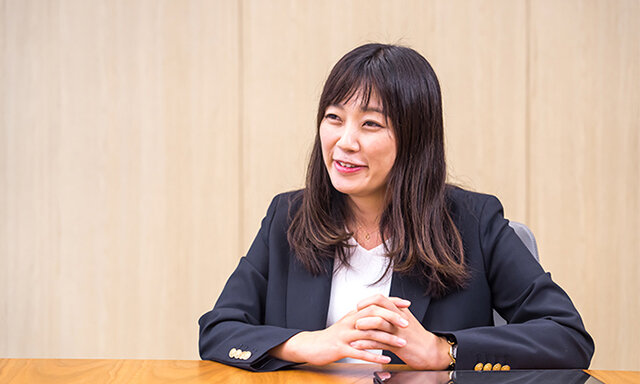 "You can change a situation if you put your ideas out and act" (Ms. Yoshida)
"You can change a situation if you put your ideas out and act" (Ms. Yoshida)POWER CONTINUE is designed to provide support for the reliable long-term operation of power generation facilities, a service we developed in partnership with multiple businesses, including leasing companies and constructors. I was stunned by the response it created; our sales division's phone was ringing off the hook. This brought home to me how you could change a situation if you put your ideas out and act.
Yokota: I agree. The meemo app tells you what option suits you best depending on where you are now and where you are headed to, whether it is the bus, a taxi, or a ride with a member of the community who has time to offer a pick-up. The objective of this project was to secure means of mobility for the community through cooperation between transportation service operators and residents of the local communities, but neither was enthusiastic about our proposals at first. For a rural community with a falling population to sustain itself, a system of "mutual aid" where residents, businesses, and the government help one another is imperative along with public aid and self-help. As we visited them and had talks over and again, the local operators little by little came to see that OMRON, whose job was to serve their community, was looking in the same directions as they were. It was by starting with recognizing what future challenges each of us had and working on them that we got to understand one another better, and that allowed us to involve a number of stakeholders in the project.
Hosoi: Few of us are able to create one from zero or grow one into one hundred. Those are the kinds of human capital that society needs.
Yoshida: I was with an affiliate company for two years on temporary assignment, and during that time, I experienced first-hand that if you took the courage to put your idea out there even if you thought it was still incomplete, people would come and work on it with you, so you could complete it just the right way. If you have a team of people who want to solve challenges in your society and they understand why you are working on something, they will offer a helping hand, drawing on their own specialties.
Yokota: There are so many people, both within and outside the company, who would give you a challenging time in an effective way. As you take a lot of different opinions, put them together here and work on them there, the whole thing will be elevated to something you would never have been able to produce on your own. That gives you a sensation you could never have enough of.
ŃĆĆ
Hosoi: Our vision under SF2030 is "Design the Next Social Structure." It reflects our resolve to design our next social system. The focus here is "design." In a world where uncertainties are rife, we hear both our customers and our top management say, "What should we do?" In the past, customers would be satisfied if we provided them with what they wanted and elevate it for them. Going forward, they are looking at the kind of picture we can draw for them. You are turning yourself into an "insider" for your customer and plan, execute, and improve on their behalf. This "insiderization" of our solutions is what we want to make sure we help make our social systems sustainable.
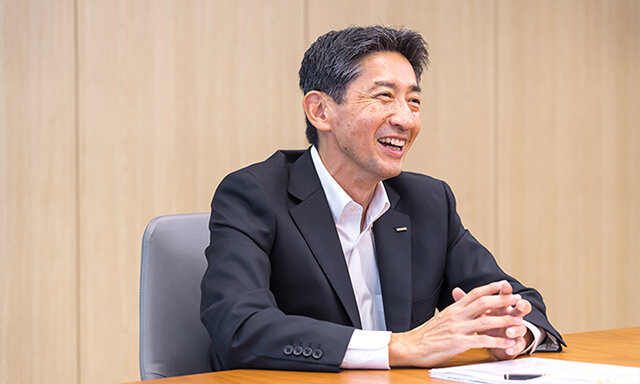 "I always ask of our people to broaden their knowledge" (Mr. Hosoi)
"I always ask of our people to broaden their knowledge" (Mr. Hosoi)What we need are people who produce. Creativity does not come out of nothing, so I always ask our people to broaden their knowledge. To do this, it is important that they have a lot of "intersections" both within the company and outside of it.
You need to have a partner to create the design with. It is not as if OMRON could create a perfect design entirely on its own. If you co-create with a number of different partners and the result of your effort leads to another opportunity for co-creation, then you have a virtuous cycle and that would be a wonderful thing. It makes you happy when someone comes to you and say, "Let's do this together."
Yokota: After we finished the field testing for meemo, the head of one of the districts of Maizuru City sent the city mayor a petition requesting that the service should be kept in place. The voice of the residents and their demand, led to the full-on installation of the service. That moment brought to me for the first time the realization that we had created a social good, something that has a positive impact on society. Using transportation as a starter, I want to create platforms for "mutual aid" and build digital social infrastructure that helps invigorate the community and its residents as well as operators. That is what I would like to work on.
Yoshida: Energy is a hot industry right now, and everyone is joining the fray. They may say they are there to tackle the social challenge that is carbon neutrality, but there comes a moment when someone puts their own interests before that noble cause. I feel it important that we have social good as a common language and go back to it as an anchoring point.
In the past, electricity was a one-way street of an energy source, in that operators supplied it to consumers. Today, however, households may have their own solar power facilities, and perhaps even battery storage, making electricity a form of energy that consumers, too, can offer up. This means that those who we used to regard as a customer may now be a partner with whom we can work. What can we do together to make our society carbon neutral? That is what we want to keep asking and work on. If we have a system based on relationships of energy mutual aid, it will nourish a sense of ownership in everyone as they work toward carbon neutrality.
Hosoi: We have set the our own 18th goal of the SDGs to "Smile for Everyone". When we have made our society a secure, safe, and fulfilling place, it would mean that people are all smiling.
Our society is littered with issues, and they are piling up high everywhere. You cannot say for certain where we should start, but we want to do anything that makes people smile. That is where we are coming from.
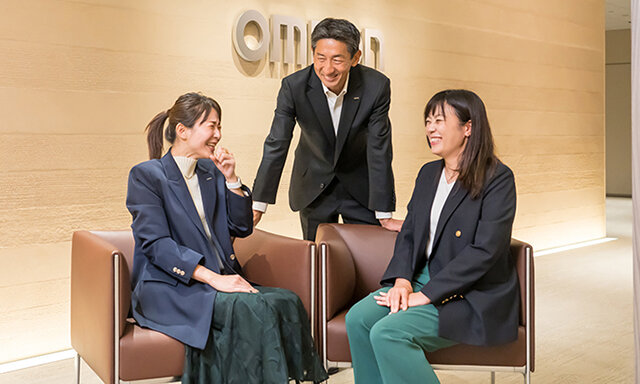 About the interviewees (From right to left)
About the interviewees (From right to left)Ms. Asami Yoshida
Assistant Manager, Emergent Strategy Dept.
Energy Solutions Business H.Q.
Ms. Yoshida first became interested in environmental issues when she was at university, and her interest has been kept alive as she works in the energy business. She has been involved in the development of key components of photovoltaic power generation facilities and a service for fixed-rate rental of power conditioners, among others. Ms. Yoshida says her experience of working at an affiliate sales and services company on temporary assignment has helped her develop a multifaceted perspective that she needs in working on the development of solutions.
Ms. Miki Yokota
Group Manager, Regional Revitalization Group
Social Design Center, Business Development H.Q.
As a university student, Ms. Yokota participated in activities in aid of disaster recovery efforts in areas hit by the Great East Japan Earthquake, and the experience led her to pursue a career that contributes to solving issues that regional communities face. Since joining OMRON four years ago, she has been instrumental in the promotion of a comprehensive partnership agreement with Maizuru City, Kyoto Prefecture, with an aim to solve challenges unique to a provincial city such as Maizuru. The company has since signed similar partnership agreements with the Cities of Hitoyoshi and Uki in Kumamoto Prefecture as Ms. Yokota continues to work on regional development.